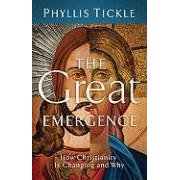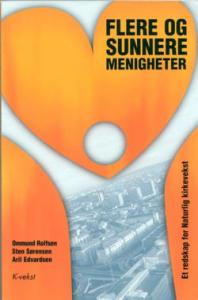 I just finished reading Phyllis Tickle’s new book The Great Emergence. Its very well written and its amazing how she, in a quite a short book, manages to describe the cultural and religious changes that have been occurring in North American culture for the last two centuries (its written with North America in focus, but many of the shifts have affected the Western world as a whole). Her main thesis is that every five hundred years or so the Church experiences a “great rummage sale”, a time of profound change and reorientation: the Great Reformation in the 1500’s, the Great Schism in the 1000’s, around the 500’s you have the fall of Rome, Gregory the Great and Monasticism, and if you go back yet another five hundred years, well, you have the birth of Christianity. According to Tickle we are due for yet another time of reform and reorientation, the Great Emergence.
I just finished reading Phyllis Tickle’s new book The Great Emergence. Its very well written and its amazing how she, in a quite a short book, manages to describe the cultural and religious changes that have been occurring in North American culture for the last two centuries (its written with North America in focus, but many of the shifts have affected the Western world as a whole). Her main thesis is that every five hundred years or so the Church experiences a “great rummage sale”, a time of profound change and reorientation: the Great Reformation in the 1500’s, the Great Schism in the 1000’s, around the 500’s you have the fall of Rome, Gregory the Great and Monasticism, and if you go back yet another five hundred years, well, you have the birth of Christianity. According to Tickle we are due for yet another time of reform and reorientation, the Great Emergence.
Although this grand narrative and big theory raises some questions, it is thought provoking. And what if maybe she’s actually on to something? The world is changing dramatically, and the Church is experiencing some profound shifts. And she is not the first to point out the similarities between the Emerging Church conversation and the Reformation.
Nevertheless, its a great read, if only for her brilliant overview of the cultural changes that have occurred in North America and most of the Western world as a whole: Darwin, Faraday, Freud, Jung, Campbell, the T-ford, the coming of radio and TV, Einstein, Heisenberg’s Uncertainty Principle, Albert Schweitzer’s The Quest for the historical Jesus, Pentecostalism, changes in family life and the nuclear family, women’s liberation, Karl Marx, Alcoholics Anonymous, the drug age of the 60’s and 70’s, New Age, information technology and the World Wide Web… One might think that she’s trying to cover to much ground, but she manages to hold it all together and actually paint a vert clear and compelling picture. The main question during this time of change and upheaval according to Tickle, as with all other great hinge-times, is the question of authority: as the doctrine of sola scriptura becomes more and more problematic, where then may we find the authority for our faith?
Phyllis Tickle has partnered up with Emergent Village, together they are hosting the Great Emergence National Event in Memphis, Tennessee. Starting today, actually.
 Under Utmanad (Baptistsamfundets, Svenska Missionskyrkans och Metodistkyrkans gemensamma årskonferens i maj) träffade jag Marcus Hällzon-Polack, publisher på Marcus Förlag. Trevligt att träffa honom, det var ett tag sen sist. I alla fall, till min stora glädje fick jag en bok av honom – Människor som tror av Alexander Hagerius. Hagerius har rest genom Sverige och intervjuat människor om deras tro. Författaren skriver själv följande om boken: “Jag ser den här samlingen av röster och texter som ett avtryck i tiden. Jag ser också framtidens kyrka i berättelserna.”
Under Utmanad (Baptistsamfundets, Svenska Missionskyrkans och Metodistkyrkans gemensamma årskonferens i maj) träffade jag Marcus Hällzon-Polack, publisher på Marcus Förlag. Trevligt att träffa honom, det var ett tag sen sist. I alla fall, till min stora glädje fick jag en bok av honom – Människor som tror av Alexander Hagerius. Hagerius har rest genom Sverige och intervjuat människor om deras tro. Författaren skriver själv följande om boken: “Jag ser den här samlingen av röster och texter som ett avtryck i tiden. Jag ser också framtidens kyrka i berättelserna.” 
 I just finished reading
I just finished reading 
